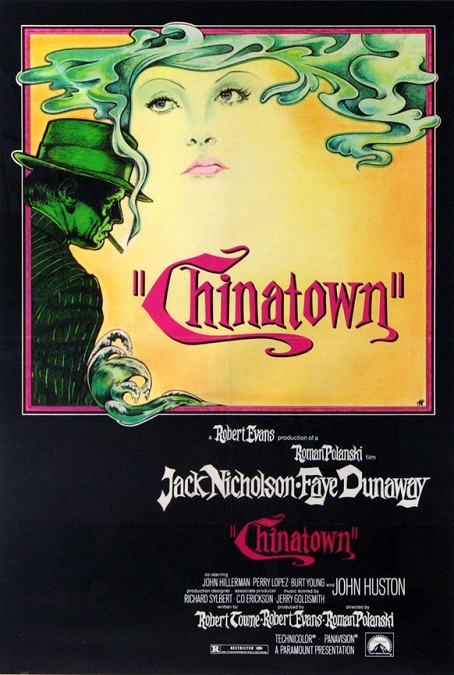
Chinatown – 1974
I have been looking forward to seeing this movie for a while, and I was not disappointed. I really enjoyed it! The acting was excellent, the direction was interesting and captivating, the sets and costumes were spot-on, and the plot was engaging. It was a modern film noir starring Jack Nicholson as private eye, J. J. Gittes, and Faye Dunaway as Evelyn Mulwray.
Gittes is the classic gumshoe, played along the same line as Sam Spade, and it even follows several common tropes of the genre. He is a private investigator with an office and a secretary. And he’s in it for the money. He is mostly hired by women who want proof of their husbands’ cheating. When a wealthy woman calling herself Mrs. Mulwray, wife of Hollis Mulwray, the Chief Engineer of the Los Angeles Department of Water and Power, asks him for such evidence, he takes the job. He follows the woman’s husband and takes some photos of his rendezvous with a beautiful young woman.
But then, once the incriminating photos show up in the newspaper, the real Mrs. Mulwray, Dunaway, shows up and threatens to file a law suit against Gittes. Unfortunately, Hollis Mulwray soon turns up dead and his mistress goes missing. And there’s the setup. So while it is certainly a who-done-it mystery, it has a bit of an intellectual edge, because the crime isn’t one of passion. The reason for the murder is money, which is a byproduct of shady deals taking place at the Department of Water and Power.
The plot is complex but not too difficult to follow. It draws you in and holds your attention. The mystery moves at a good pace and has several twists and turns, as one might expect from a crime drama. And the script was so well written, that as the list of murder suspects starts to take shape, each potential killer is believable. Was it Evelyn, the victim’s jealous wife? Or was it Noah Cross, played by John Huston, Evelyn’s father and Hollis’s former business partner? Or maybe it was Russ Yelburton, played by John Hillerman, who stood to inherit Hollis’s high profile job. Or perhaps it was his missing mistress.
I’ve always seen Nicholson as a good actor, and his performance in Chinatown helps to bolster that opinion. He seemed quite natural in the skin of his character. He was bold and brash, yet cool and calculating at the same time. He had brains and a quick wit, and yet his reckless and impulsive behavior often got him in a little over his head. Nicholson made it all look effortless. His character hints at a checkered past, working in Chinatown, which helps to give the movie its title.
And I have to give a special thumbs-up to Dunaway. She was set up to be a fem-fatale, and she played it incredibly well. She was mysterious and secretive when she needed to be, but vulnerable and alluring when she started to fall for Gittes. In fact, I would almost go as far as to say that she was sometimes a bit of a scene-stealer, though Nicholson was certainly able to hold his own opposite her.
Houston also did a fine job. Spoiler alert: he was the villain, and though he was clearly a cold-hearted criminal, he could have easily played his part as just a run-of-the-mill, evil bad-guy. But he didn’t. He was charming, and had a likeable personality. There was a heart beating inside him, twisted as it was, and Houston did a great job of letting it show at just the right times. And his voice sounded so familiar that I had to look it up. He was the voice of Gandalf the Gray in the 1977 Rankin Bass animated feature, The Hobbit.
But I think that the real stars of the film were Robert Towne and Roman Polanski, the film’s screenwriter and director, respectively. They really did a fantastic job of creating a cast of characters that were well-developed and believable, even while they adhered to the stereotypes of the genre. That alone was pretty impressive. One of the biggest reasons the movie was so good, was that they successfully fought with the producer, Robert Evans, on the film’s ending.
Evans wanted a watered down, Hollywood ending. He wanted the bad guy to die and the beautiful woman to end up with the hero. But sometimes, bad guys win, and good guys die. Towne and Polanski kept the ending they wanted, and it was not only appropriate, it gave extra weight and a sense of tragedy to the plot that fit in perfectly with the private eye stereotype. Wonderful writing!
And as an interesting note, watch out for the little cameo of Roman Polanski as the thug who slices Gittes’s nose. His screen-time was short but memorable. All in all, the film was both fascinating and fun to watch. It was nominated for 9 Academy Awards, which included both Nicholson and Dunaway for Best Actor and Best Actress, and Best Director for Polanski. Unfortunately, it only won one: Robert Towne, took home the Oscar for Best Original Screenplay. I’d say it was well-deserved.
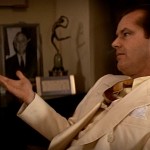
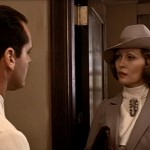

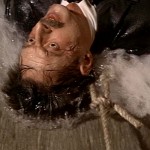
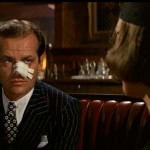
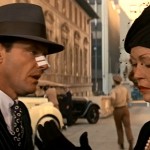
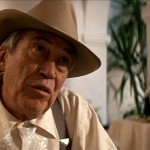
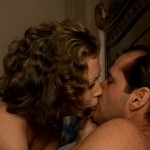
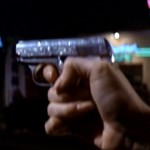
Chinatown is Polanski’s best film, better than The Pianist, and should have won the Oscar for Best Picture, even though The Godfather Part 2 won the Oscar that year. Chinatown is one of the finest films ever made.